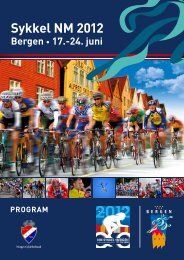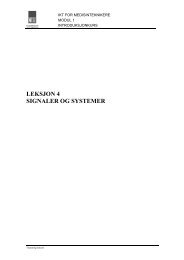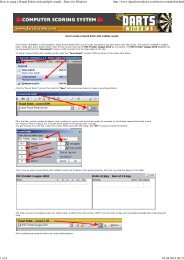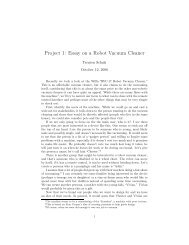The Online World resources handbook
The Online World resources handbook
The Online World resources handbook
You also want an ePaper? Increase the reach of your titles
YUMPU automatically turns print PDFs into web optimized ePapers that Google loves.
You pay little for a lot! http://home.eunet.no/~presno/bok/15.html<br />
simultaneous users, and their applications. This also applies to online services. <strong>The</strong> load<br />
is normally lowest, when most users are asleep, and during weekends. When the load is<br />
low, you get more done per minute.<br />
Planning and self discipline pays off<br />
<strong>The</strong> actual cost of using a given set of services depends much on your self discipline, the<br />
tools you use, and on how well prepared you are:<br />
If accessing manually, use "quick" commands rather than menus to move at<br />
maximum speed to desired sources of information.<br />
On the Web, let your browser's bookmark feature take you directly to the desired<br />
page rather than navigating down the tree from a home page.<br />
Do not set your services to be used with colors, sound, or special methods for<br />
displaying graphics, unless you have no choice, or are willing to pay the extra<br />
cost. <strong>The</strong>y increase the volume of transferred text, and lower effective speed.<br />
Experienced Web users disable receipt of images to reduce the volume of data.<br />
Later, all it takes is to click at "Reload Images" to get images you absolutely want<br />
to see.<br />
If your primary interest in the Web is text, then test out Lynx, if available on your<br />
ISP's host (see Appendix 6). No windows based graphical browser can match its<br />
speed.<br />
Get the information you want and disconnect. It is often unnecessary to read<br />
while online. Log off to read. If cost is high, call back for more to read,<br />
disconnect, and then call back again.<br />
Most popular Web browsers store received pages and images temporarily in a<br />
cache on your hard disk. For example, Netscape stores them in the default<br />
\NETSCAPE\CACHE directory. Make sure that your browser uses its cache. It<br />
may increase speed considerably!<br />
Internet's shareware libraries have many tools designed to let you read and use the<br />
cached Web pages after your online visit. Look for programs with names like<br />
Cache Master and WebSaver.<br />
Learn how to write your mail offline, and send letters "in a batch" to your<br />
mailbox. In addition to the time and cost benefits, your messages are likely to<br />
contain fewer typing errors, and be better thought out.<br />
Consider automating your communication (see Chapter 16). I use a local BBS this<br />
way. A while ago, it gave me the following progress report: "Time on: 17 hrs 43<br />
min, today 0 hrs 0 min, total 827 times." In average, I spend around 1.3 minutes<br />
per call. <strong>The</strong> other day, I was connected for 2:48 minutes. <strong>The</strong> result was 106<br />
kilobytes' worth of conference mail.<br />
Modem speed and cost<br />
2400 bps is a sensible modem speed for some applications, and used to be a good<br />
starting point for new onliners. <strong>The</strong> benefits of using a faster modem may be marginal<br />
when<br />
navigating your favorite service considerably reduces the effective speed, and you<br />
access the service manually.<br />
you pay considerably more for access at higher speed.<br />
the relative price of a faster modem in your country is prohibitive.<br />
your network does not offer higher speeds.<br />
On the other hand, a modem doing 14400 bps or more, will give you at least six times<br />
faster communication. For some applications, this means much lower costs. Also, if<br />
doing things faster is more important than keeping costs down, then it is a wise<br />
investment.<br />
If you plan to use the <strong>World</strong> Wide Web with a graphical browser, then<br />
4 of 6 23.11.2009 15:49

















